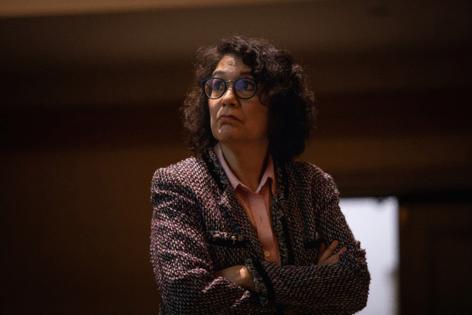Trump administration replaces commissioner overseeing management of sewage crisis
Published in News & Features
Maria-Elena Giner, an appointee of former President Joe Biden who is credited with overhauling the underfunded and mismanaged U.S. International Boundary and Water Commission, has been replaced with a President Donald Trump appointee.
William “Chad” McIntosh, who was serving as the Environmental Protection Agency’s acting deputy administrator under Administrator Lee Zeldin, has been appointed to lead the binational agency responsible for treating sewage from Mexico, a White House official said.
The personnel change comes at a critical time for the IBWC as it works to repair and expand the aging South Bay treatment plant, a long-awaited project that broke ground last year and will double the facility’s capacity. It also comes as Zeldin plans to tour the plant on Tuesday and speak about efforts to stop the decades-long sewage crisis.
McIntosh had previously served under the first Trump administration as head of the EPA’s International and Tribal Affairs and was appointed to acting deputy administrator earlier this year.
Before joining the federal agency, McIntosh managed global and environmental policy at the Ford Motor Company for nearly two decades. According to a 2018 EPA news release, McIntosh also served as deputy director for the Michigan Dept. of Environmental Quality, where he worked closely with Tribal and state leaders, oversaw regulatory reform and criminal investigations, and directed the development of administrative rules packages for the state.
Giner said in a statement on LinkedIn that serving as commissioner “has been the honor of my lifetime” and the “hardest job I have ever had, but the most rewarding.”
In her resignation letter Monday, Giner thanked Trump for “allowing me to stay in this position these last four months to continue the mission-critical work” until a replacement was named. Giner congratulated McIntosh over the weekend and said that he is “clearly excited about taking on this new challenge and has much experience in public service.”
“As sad as I feel in leaving this position, I am proud of our accomplishments at the IBWC during our almost 4 years together,” Giner said.
Mexico and the U.S. are represented on the IBWC by a commissioner appointed by their respective presidents. They oversee multiple infrastructures along the international border.
In San Diego, the U.S. section of the agency is responsible for treating some of Tijuana’s wastewater at the San Ysidro-based South Bay International Wastewater Treatment Plant before releasing it into the Pacific Ocean.
But years of mismanagement, understaffing and equipment failure on both sides of the border, as well as partisan politics, have resulted in beach closures due to contaminated ocean water, economic losses and increasing concerns about the long-term health effects of polluted air and water exposure.
Insufficient and broken treatment infrastructure in Mexico forced the U.S. plant to take more wastewater than it was designed to handle. That took a toll on the South Bay plant. Almost every part of the nearly 30-year-old plant has had to be fixed. The plant has frequently been clogged with sewage, garbage and sediment, allowing several million gallons a day of partially treated wastewater to make its way into the ocean. As a result, the agency’s plant has been cited multiple times for violating water and local air quality standards.
But since her appointment in August 2021, Giner had worked to overhaul operations at the South Bay plant to bring it up to speed after years of poor organization and underinvestment. Under her watch, the long-awaited project to repair and expand the plant broke ground with a contract that aims to shorten the construction schedule and minimize cost risks.
She brought to light the many challenges that the agency faced, including that the IBWC was severely underfunded and understaffed for decades. From 2010 to 2020, for example, the agency had a $32 million annual budget to maintain two wastewater treatment plants, two international dams, two ports of entry, levees and several hundred monuments.
Giner’s relentless advocacy with federal elected officials led to Congress approving $156 million for the IBWC’s construction projects last year, a $103 million increase from the previous year’s construction funding. Congress also changed the law allowing the IBWC to receive funding from state and local governments and nonprofits.
She also developed an asset management office and a long-term capital plan for the agency to better budget its funding, and she reduced the vacancy rate to less than 10%.
Giner had also confronted criticism from frustrated residents at IBWC community forums and water quality cops, who argued that despite increased investment from the federal government in recent years, efforts to stop sewage spills fell short. Giner had explained on multiple occasions that unprecedented flows and sedimentation from Mexico had compromised much of their infrastructure efforts.
She committed to keeping Mexico accountable. In recent weeks, amid infrastructure issues south of the border that led to increased wastewater flows in the Tijuana River and complaints about noxious odors, Giner said she communicated daily with Mexican officials to ensure they expedited repairs to stop pollution before reaching the U.S.
“She was always an honest partner, giving us the true picture of the problem even when it was not convenient,” Rep. Scott Peters said in a statement on social media. “While she may not be commissioner when we finally cut the ribbon on our improved treatment plant, the communities in the South Bay and Coronado will not forget her role in making it possible.”
_____
©2025 The San Diego Union-Tribune. Visit sandiegouniontribune.com. Distributed by Tribune Content Agency, LLC.







Comments